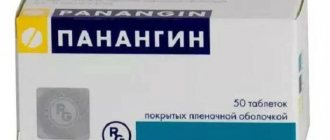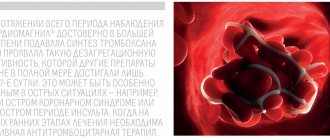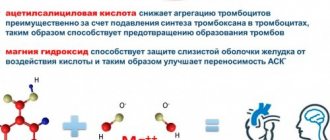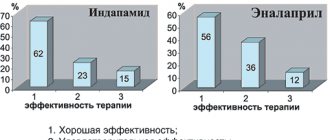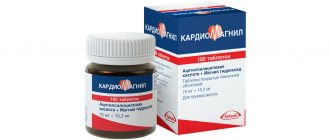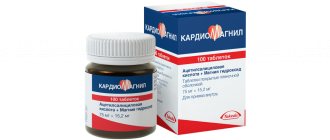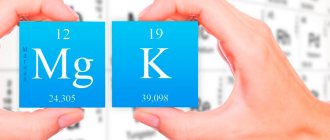Updated: 04/23/2021 15:12:57
Expert: Abramova Tsilya
| Panangin | |
| Advantages | Flaws |
| Smooth restoration of mineral balance | Many contraindications |
| Wide range of applications in cardiology and neurology | Not prescribed in the 1st trimester of pregnancy |
| Low likelihood of hypercalcemia | |
| Cardiomagnyl | |
| Advantages | Flaws |
| The presence of magnesium hydroxide reduces the negative effect of ASA on the gastrointestinal tract | Cannot be used during pregnancy in the 1st and 3rd trimesters |
| Many indications for disease prevention and treatment in cardiology | Increases the risk of bleeding |
| Pronounced antiaggregation effect | Adverse symptoms from the gastrointestinal tract |
How do the drugs differ from each other?
The main differences between these medications are composition and price.
Despite the fact that their indications are very similar, the pharmacological effects of the drugs are very different. Cardomagnyl is a combination drug that contains acetylsalicylic acid and magnesium hydroxide as active ingredients. It is intended for the prevention of thrombotic complications.
Acetylsalicylic acid (aspirin) is a substance from the class of non-steroidal anti-inflammatory drugs. It also has analgesic and antipyretic properties, but the main effect in this case is its antiplatelet effect. Aspirin prevents platelets from sticking together and starting the blood clotting system, thereby preventing the development of heart attacks and stroke.
Magnesium hydroxide plays a supporting role in this drug. It is used as an antacid, that is, it protects the gastric mucosa from the negative effects of acetylsalicylic acid (since one of its most common side effects is the provocation of ulcers). This is very important, since Cardiomagnyl is usually taken on an ongoing basis, and therefore the risk of complications is quite high.
Indications for the use of Cardiomagnyl are various cardiovascular diseases:
- coronary heart disease (including unstable angina);
- acute coronary syndrome (myocardial infarction);
- hypertonic disease;
- the patient has intracardiac and intravascular implants;
- primary prevention of thromboembolic complications in patients with risk factors (diabetes mellitus, obesity, hyperlipidemia, atherosclerosis, surgical interventions on the heart and blood vessels).
Panangin is also a combination drug, but its composition is somewhat different. It contains the macroelements Magnesium and Potassium in the form of aspartate salts. They are the main intracellular ions and take part in many chemical reactions, especially in the activity of the heart. Their deficiency impairs the contractile function of the myocardium, reduces cardiac output, leads to arrhythmias, affects protein synthesis, and increases muscle demand for oxygen. Ultimately, this can lead to the development of myocardiopathy.
Therefore, if a patient has a deficiency of these macroelements, the doctor prescribes medications like Panangin, Asparkam, Cardium. Most often they are used for the following pathologies:
- complex therapy of coronary heart disease and its complications;
- post-infarction state;
- chronic heart failure;
- to reduce the toxicity of cardiac glycosides;
- heart rhythm disturbances (ventricular tachyarrhythmias, extrasystoles);
- Potassium and Magnesium deficiency (when taking diuretics (diuretics), malnutrition, pregnancy).
Used to prevent stroke in the presence of predisposing factors.
Thus, we can conclude that these are drugs with completely different pharmacological effects, but they are used in the treatment of the same diseases of the cardiovascular system.
The cost of drugs does not differ significantly. 50 tablets of Panangin can be purchased for a price of 50 rubles, while Cardiomagnil costs at least 100 rubles.
These drugs have a large number of contraindications and adverse reactions. Before using the products, you must read the instructions and also consult your doctor.
Which drug is better
Panangin and Cardiomagnyl combine only some indications for use. These are products of different composition and properties that are not interchangeable. Cardiomagnyl is prescribed for the risk of diseases associated with the formation of blood clots. Panangin is used to improve the condition of the cardiovascular system by replenishing calcium and magnesium deficiency.
Panangin is an antiarrhythmic drug, Cardiomagnyl is an antiplatelet drug. The first normalizes the heart rate, the second normalizes blood circulation in the myocardium.
Both drugs are important in cardiology. Panangin is more often used for heart failure and arrhythmias, but only in combination with other medications. For many disorders, Cardiomagnyl is a drug of primary importance and is used in monotherapy.
In some cases, Cardiomagnyl and Panangin can complement each other’s action, as in angina and heart attack. In any case, treatment is carried out under the supervision of a doctor.
In which case, which medicine should I take?
Since the pharmacological effects of Anangin and Cardiomagnyl are different, they are indicated to achieve different therapeutic goals.
Cardiomagnyl is suitable in cases where there is a high risk of blood clots that clog blood vessels and cause ischemic complications - strokes, heart attacks or pulmonary embolism. It thins the blood, improves microcirculation in the capillaries, and strengthens their walls. Indicated for use to reduce the risk of thrombosis.
Despite the fact that the drug contains Magnesium, its amount is not comparable to that of Panangin, and the compound with hydroxide is absorbed worse than with aspartate. In addition, this macronutrient alone is not enough, since it will only be effective when combined with potassium.
The main advantage of Panangin can be considered its ability to improve the physiological capabilities of the heart. In a patient with coronary artery disease or cardiomyopathy, the hypertrophied myocardium requires more oxygen to pump blood. The drug reduces this need, and the likelihood of a heart attack decreases. In addition, it restores heart rhythm and normalizes contraction frequency, which also prevents the development of dangerous arrhythmias.
In general, these medications can be called synergistic drugs. They improve the activity of the heart and protect it from negative influences, that is, they work towards the same goal, albeit in different ways. At the same time, it is impossible to replace one drug with another, since their mechanism of action is different and they affect different parts of the pathogenesis of cardiopathologies.
It is not recommended for healthy people to take these medications without permission to prevent cardiovascular diseases. This makes no sense and can only provoke the development of side effects.
Basic principles of selection and reception
In order to get the maximum benefit from using vitamin complexes, it is important not only to be able to combine them correctly, but also to take them taking into account some recommendations:
- Reduce consumption of coffee, strong tea and dairy products;
- Do not exceed daily intake;
- Choose according to age and body needs;
- Study the composition before purchasing and the expiration date;
- If you have problems swallowing tablets, it is better to buy them in the form of drops or syrup;
- Store according to instructions;
- Drink with clean water;
- At the first sign of an allergy, stop taking it.
To get the maximum results from taking multivitamins and reduce the risk of possible side effects, when purchasing, you need to pay attention to the absence of dyes and flavors and other allergens.
Buying a medicine containing all the necessary substances at a pharmacy is quite simple. However, they should not be perceived as a “panacea”; it is important to remember that the only useful source of all vitamin and mineral components is food and a healthy lifestyle. You should not take vitamin supplements thoughtlessly, as they can bring both benefit and harm. Ideally, you need to undergo the necessary examinations, determine the deficiency of one or another component, and only then, according to a preliminary medical prescription, carry out treatment or preventive measures. After all, self-medication can cause significant harm to health.
Can I take both medications at the same time?
Taking Panangin and Cardiomagnyl at the same time is completely acceptable. However, caution must be exercised in this case. The use of drugs in high doses can provoke the development of hyperkalemia. This is a serious condition that leads to cardiac dysfunction and is characterized by sudden weakness and slowing of the pulse. In particularly unfavorable cases, ventricular fibrillation may develop, which can be fatal.
To avoid adverse reactions, you must strictly follow the dosage prescribed by your doctor. It is also recommended to periodically check your blood electrolyte levels.
The risk of hypermagnesemia also increases, which is manifested by the following symptoms: nausea, vomiting, speech impairment, drop in blood pressure, cardiac arrest.
During the course of treatment with these medications, drinking alcohol is prohibited, as this increases the likelihood of side effects, especially from the gastrointestinal tract.
The following side effects may occur while taking medications:
- allergic reactions to the active and auxiliary components of the tablets;
- dyspeptic disorders (nausea, vomiting, diarrhea);
- ulcerative lesions of the stomach and duodenum;
- bronchospasm;
- hearing impairment.
- hemorrhagic syndrome
A more detailed list of contraindications and side effects can be found in the official instructions.
In any case, before using these funds, you should consult a cardiologist and undergo all necessary tests.
Comparison of Panangin and Cardiomagnyl
| Component | Panangin | Cardiomagnyl (heart-shaped tablets) | Cardiomagnyl (oval tablets) |
| Magnesium | 140 mg (as aspartate) | 15.2 mg (as hydroxide) | 30.3 mg (as hydroxide) |
| Potassium aspartate | 158 mg | — | — |
| Acetylsalicylic acid (aspirin) | — | 75 mg | 150 mg |
| Number of tablets | Packs of 50 pcs. | Bottles of 30 or 60 pcs. | |
The drugs do not replace each other, but rather complement each other.
If Cardiomagnyl prevents the formation of blood clots, then Panangin is prescribed for chronic heart disease for the normal functioning of the cardiovascular system. Aspirin, which is part of Cardiomagnyl, performs a therapeutic function, but compared to Panangin it has a large number of side effects. The question arises: is it possible to take Panangin and Cardiomagnyl at the same time? Your doctor may allow you to take these medications together in combination. Drugs can be additional means for both the prevention and treatment of heart and vascular diseases. There are more expensive and high-quality analogues. Cardiomagnyl is produced in Denmark and is much more expensive than Panangin. Contraindications
| Panangin | Cardiomagnyl |
| [General:] childhood; hypersensitivity to components. | |
| Renal failure (acute and chronic); hypermagnesemia and hypermagnesemia; AV block I–III degree; cardiogenic shock; myasthenia gravis; acute metabolic acidosis; hemolysis; violation of amino acid metabolism; Addison's disease; dehydration. The period of lactation and pregnancy (especially in the first trimester) with the permission and under the supervision of a doctor. | Hypermagnesemia, children under 18 years of age; severe renal failure; bleeding in the brain; tendency to bleeding (vitamin K deficiency; hemorrhagic diathesis; thrombocytopenia); erosive and ulcerative lesions of the gastrointestinal tract; bleeding from the gastrointestinal tract; for bronchial asthma induced by taking salicylates and NSAIDs; simultaneous use with methotrexate; deficiency of glucose-6-phosphate dehydrogenase; Periods of pregnancy and lactation. |
However, your doctor should help you choose which drug is best. Since self-medication of cardiovascular pathologies is strictly prohibited due to serious side effects and the risk of irreversible processes in the human body.
Panangin or cardiomagnyl: which is better for prevention
In 1988, an American study of 22,000 people concluded that daily consumption of cardiomagnyl in healthy people reduced the risk of heart attacks by 44 percent. After the study, drugs containing acetylsalicylic acid began to be used everywhere.
The preventive use of cardiomagnyl is very controversial. Because healthy people taking this drug may suffer from serious side effects: internal bleeding, stomach pain and more.
Cardiomagnyl has a preventive effect on various types of cancer of the digestive system, such as colorectal or esophageal cancer. However, even in this context, the careful use of cardiomagnyl is controversial due to the risk of internal bleeding.
Panangin is a safe remedy with fewer side effects than cardiomagnyl. However, chronic use increases the risk of hyperkalemia and hypermagnesemia. Both medications can only be used in cases of serious cardiovascular disorders and with the advice of the attending physician.
conclusions
These drugs are different medications with different compositions and have excellent pharmacological effects. However, they serve one purpose - the prevention and treatment of heart disease, most often angina.
Choosing “Panangin or Cardiomagnyl?” depends on which link in the pathogenesis of a particular disease the therapy is aimed at. The first drug improves the electrolyte composition of the blood, restores normal rhythm, the second one prevents the occurrence of thrombotic complications.
Cost and analogues
| Means | Price | Analogs |
| Panangin | Tablets No. 60 – from 330 rubles Ampoules 10 ml No. 5 – from 160 rubles | Asparkam Asparkade Cardioarginine-Health |
| Cardiomagnyl | Tablets No. 100 – from 190 rubles | Magnicor Cormagnyl Combi-Ask Aspimag |
